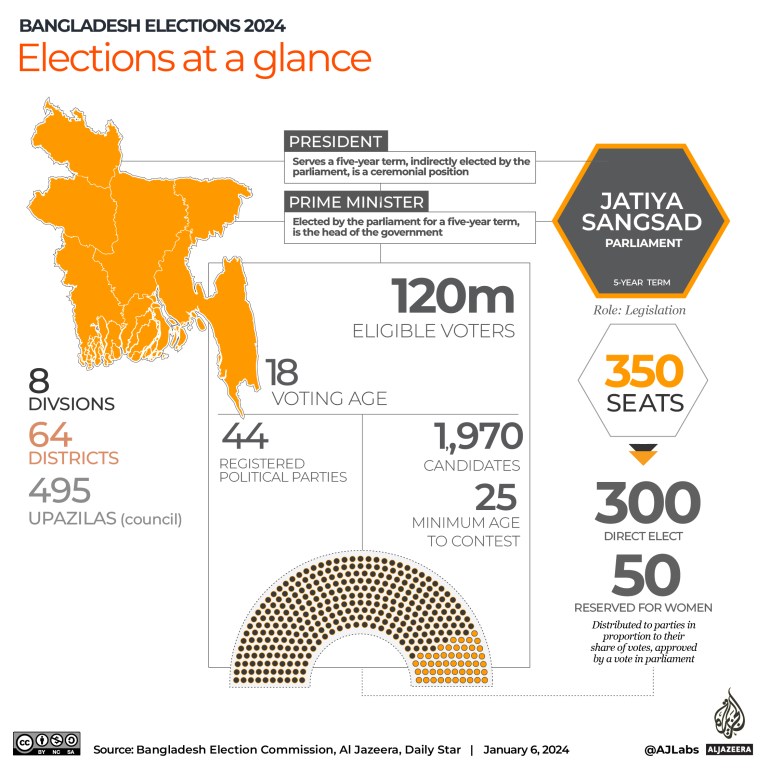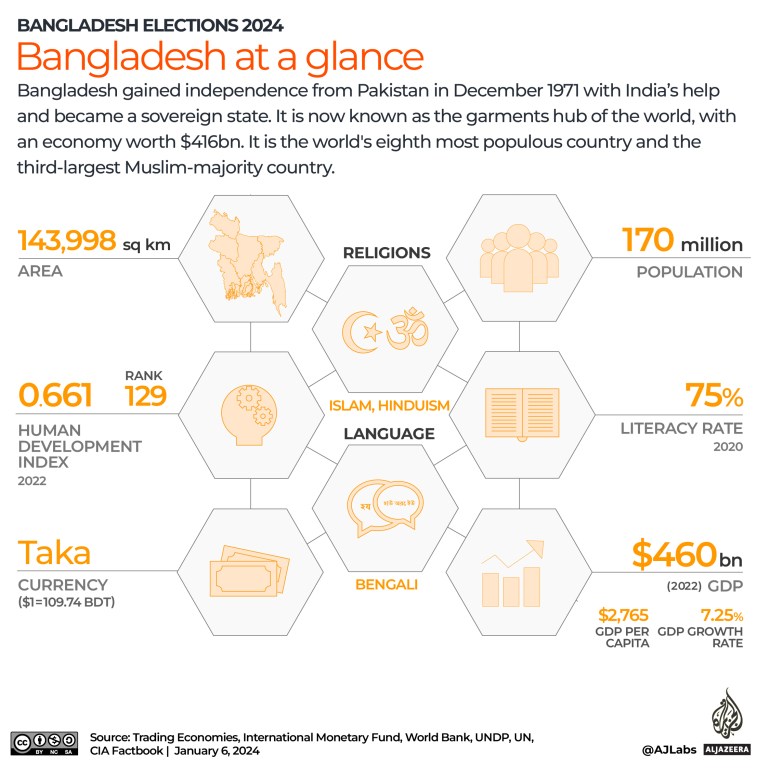
Bangladesh election officials are counting votes after a controversial poll, fraught with violence and boycotted by the opposition, is guaranteed to give a fourth straight term to Prime Minister Sheikh Hasina.
Bangladeshis largely stayed away from the vote on Sunday as initial signs suggested a low turnout, despite widespread reports of carrot-and-stick inducements aimed at bolstering the poll’s legitimacy.
“Vote counting has begun,” said election commission spokesman Shariful Alam.
Later on Sunday, local media reported that Hasina’s Awami League won 216 seats out of 299, independent candidates took 52, and the Jatiya Party took 11 seats. The results for the rest of the constituencies were still coming in.
Official results from the election commission are expected on Monday morning.
Turnout was 27.15 percent at 3pm (09:00 GMT), an hour before polls closed, the election commission said, compared with an overall turnout of more than 80 percent in the last election in 2018.
Voting was cancelled at three centres due to irregularities, said Jahangir Alam, secretary of the commission.
Independent election observer and civil society activist Badiul Alam Majumder told Al Jazeera he did not consider the vote a “proper election at all”.
“It has a seriously low turnout – probably the lowest I have seen in my life,” he said, adding that his organisation did not officially monitor the vote this year.
Hasina, 76, urged citizens to cast their ballots and show their faith in the democratic process, branding the main opposition Bangladesh Nationalist Party (BNP) a “terrorist organisation”.
Accompanied by her daughter and other family members, Hasina voted at the capital Dhaka’s City College minutes after polling began.
“Bangladesh is a sovereign country and people are my power,” she said after voting, adding that she hoped her party would win the people’s mandate, which would give it a fifth term since 1996.
“I am trying my best to ensure that democracy should continue in this country.”
The BNP, whose ranks have been decimated by mass arrests, called a two-day nationwide strike through Sunday, urging people to not participate in what it called a “sham” election.
BNP chief Tarique Rahman, speaking from Britain where he lives in exile, said he was worried about ballot stuffing.
“I fear that the election commission may increase voter turnout by using fake votes,” he told AFP news agency.
Hasina last year refused BNP demands to resign and allow a neutral authority to run the election, accusing the opposition of instigating antigovernment protests that have rocked the capital since late October and killed at least 14 people.
Rights groups have warned of virtual one-party rule by Hasina’s Awami League in the South Asian country of 170 million people after the boycott by the BNP and some smaller allies.
Tanvir Chowdhury, Al Jazeera correspondent in Dhaka, said there was a “lack of interest and enthusiasm” among the people.
“The city is quiet and sombre. No one wants to speak freely on camera. People are saying off the record this is all very predictable. It is not an inclusive election.”
At least four people were killed on Friday in a passenger train fire that the government called arson. Several polling booths, schools and a Buddhist monastery were set ablaze days before the poll.
A person in Munshiganj, south of the capital Dhaka, was hacked to death on Sunday morning, district police chief Mohammad Aslam Khan said, adding that it was unclear if the killing was related to political violence.
Police in Chandpur district about 110km (70 miles) from Dhaka fired tear gas to disperse BNP supporters who had blocked roads to disrupt voting and threw stones at security forces, said district police chief Saiful Islam.
Supporters of the Awami League and independent candidates clashed in some districts, amid allegations that ruling party cadres were stuffing sealed ballot papers in voting boxes, local media reported.
Bangladesh deployed nearly 800,000 security forces to guard polling booths and troops were mobilised nationwide to assist in maintaining peace.
About 120 million voters were choosing from nearly 2,000 candidates for 300 directly elected parliamentary seats. There are 436 independent candidates, the most since 2001.
The opposition BNP, its top leaders either in jail or exile, says the Awami League has propped up “dummy” candidates as independents to try to make the election look credible, a claim the ruling party denies.
Hasina said she did not need to prove the credibility of the election to anyone. “What is important is if the people of Bangladesh will accept this election.”
Politics in the world’s eighth-most populous country was long dominated by the rivalry between Hasina, the daughter of the country’s founding leader, and two-time premier Khaleda Zia, wife of a former military ruler.

Hasina has been credited with turning around Bangladesh’s economy and the key garment industry. But critics accuse her of authoritarianism, human rights violations, crackdowns on free speech and suppression of dissent.
Her Awami League party faced almost no effective rivals in the seats it contested, but it avoided fielding candidates in a few constituencies, an apparent effort to avoid the legislature being branded a one-party institution.
Michael Kugelman, director of the South Asia Institute at the Wilson Center, said none of those contesting would be able to mount much of a challenge to Hasina’s party.
“The outcome is all but guaranteed, and that is that the Awami League will return [to power] again,” he said. “Bangladesh’s democracy will be in an extremely precarious state once the election is done.”







